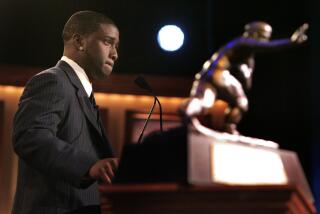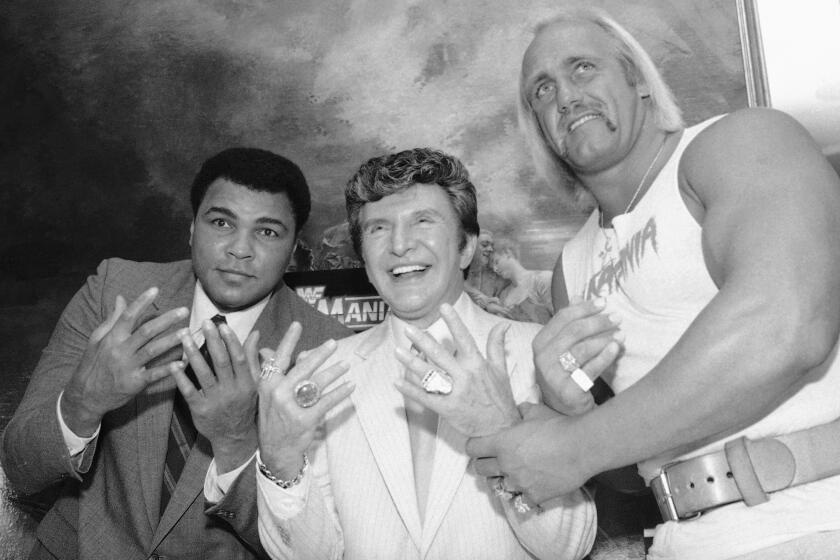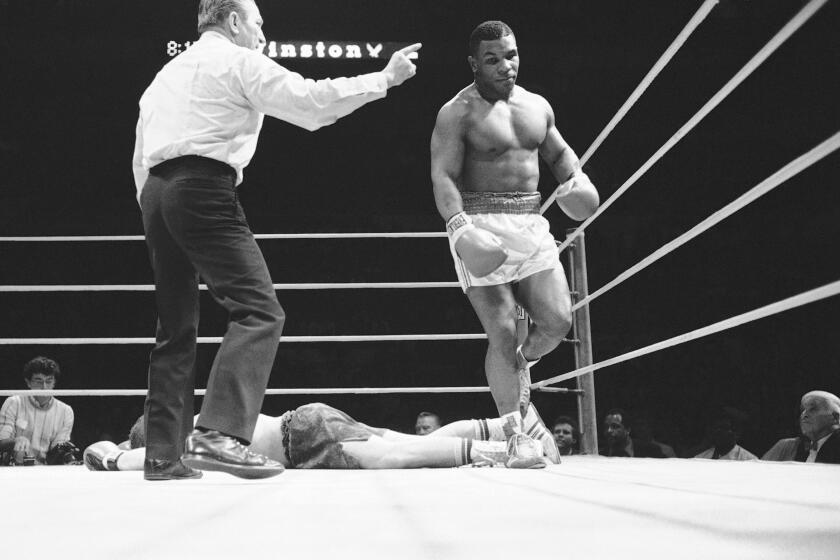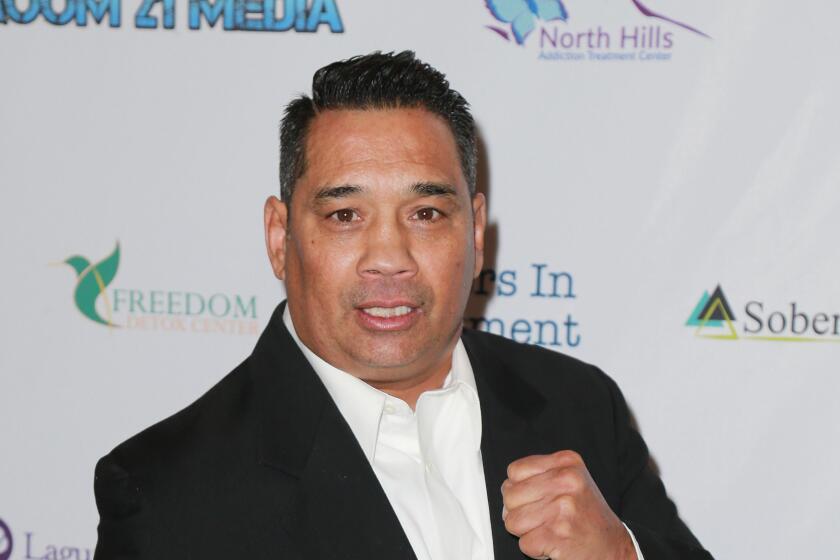Shame on Us
Jack Johnson, the first black man to become the heavyweight champion of the world, may be this country’s most famous forgotten athlete. Filmmaker Ken Burns aims to correct this memory lapse in a two-part documentary airing on PBS, Monday and Tuesday nights. “Unforgivably Black: The Rise and Fall of Jack Johnson” is not, of course, just about boxing. Burns made that clear earlier this week when he talked to The Times editorial board, bringing with him a reminder of this paper’s own past that, besides making us wince hard, helped explain the nation’s collective amnesia.
A century ago, when boxing was at the height of its popularity worldwide, blacks weren’t allowed to compete against whites in championship matches in the United States. But in 1908, Texas-born Arthur “Jack” Johnson vanquished the reigning world champ, a Canadian, in Sydney, Australia. The notion of a black champion prompted a frantic search for a “great white hope” to take back the title, or as Jack London wrote in the New York Herald, “to remove that golden smile from Jack Johnson’s face.” James K. Jeffries, an undefeated former world champion of the proper skin hue, was coaxed out of retirement to try. The match, held in Reno on July 4, 1910, was billed as the fight of the century. Johnson was the one left smiling.
Our predecessors on this page, like Johnson himself, rightly described the match as a contest between individuals, not races. They decried the post-fight riots that left at least 26 people, mostly African Americans, dead nationwide. End of credit. Far from rising above the sentiments of the day, an editorial on July 6, 1910, reproduced in its worst part here, expressed them all too shamefully. It reminded rioting whites that their “mental superiority ... does not rest on any huge bulk of muscle, but on brain development that has weighed words and charmed the most subtle secrets from the heart of nature.” A “Word to the Black Man” warned “do not point your nose too high” and intoned: “If you have ambition for yourself or your race, you must try for something better in development than that of the mule.”
A Modern Myopia
It’s a little too easy now to look back and denounce editorial writers from a century ago. Likewise, it’s all too expedient to put both time and geographical distance between ourselves and the murder charges filed in Mississippi last week for one of the most infamous crimes of the civil rights era.
It took the 1964 search teams 44 days to find the bodies of voter-registration activists Michael Schwerner, James Chaney and Andrew Goodman, who were executed and buried 15 feet beneath an earthen dam. It took the state 40 years to bring murder charges against the now-79-year-old preacher alleged to have been the local Ku Klux Klan mastermind behind the atrocity.
Ah, yes, the South. So gothic, so racist, so not Los Angeles or Chicago or New York. That negative image was conveniently reinforced at last week’s arraignment when the preacher’s 63-year-old brother knocked a cameraman to the ground and a bomb threat emptied the courtroom. But the alternative image is far more vital: Mississippi is publicly confronting the very subject most of us would rather not talk about. A biracial citizens group pressed for the case to be reopened, and persistent reporting by Mississippi’s Clarion-Ledger, which once printed whatever the Klan wanted, uncovered new evidence.
Jim Crow Laws
Now Burns reminds us that Jim Crow laws legalizing segregation and discrimination, though most prevalent in the South, were found across the country. Cities from San Francisco to Boston barred black boxers from fighting whites and even banned a motion picture of Johnson’s Reno victory.
By 1913, the country had given up hope of finding a white boxer who could win back the championship. So it went after the high- living Johnson for violating the federal Mann Act, which prohibited transporting a woman across state lines for “debauchery.”
The conviction was a sham. An initial charge fell apart after investigators realized that their “victim,” a prostitute who later married Johnson, didn’t cross a state line. Prosecutors bullied another prostitute into testifying that Johnson had paid her fare from Pittsburgh to Chicago. Both women and, indeed, all three of Johnson’s wives, were white, and that was what prosecutors found unforgivable. As Burns said in his Los Angeles visit earlier this week, “Any examination of U.S. history brings you inevitably to race.”
The filmmaker is leading an effort to win Johnson a posthumous presidential pardon. He is joined by Republican Sen. John McCain and Democratic Sen. Edward M. Kennedy, among many others. President Bush has been notoriously reluctant to grant pardons, but this one should be an easy decision for a man who, as governor of Texas, proclaimed an annual “Jack Johnson Day.”
Count the members of this editorial board among those who believe that the best way to surmount the past is to confront it. Count us among those asking that Johnson be pardoned.
More to Read
Get our high school sports newsletter
Prep Rally is devoted to the SoCal high school sports experience, bringing you scores, stories and a behind-the-scenes look at what makes prep sports so popular.
You may occasionally receive promotional content from the Los Angeles Times.






